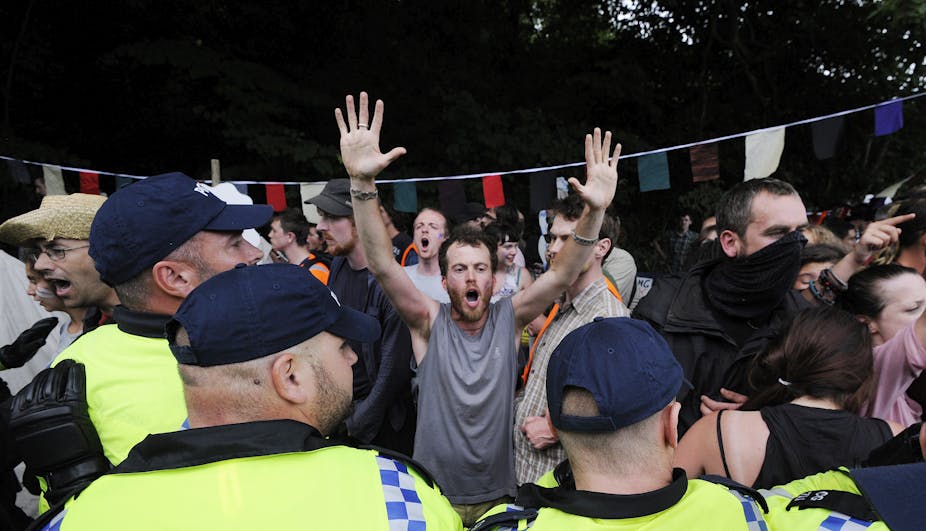Although only a small area of land has been offered to companies exploring the potential for fracking in the UK so far, much more is likely to come. But opposition to fracking is growing – and growing fast. More than 180 local groups are already in operation, which is somewhat inconvenient for a government wanting to go “all out for shale”.
In interviews, online surveys and correspondence with anti-fracking protesters, we’ve heard personal testimony that suggests that problems with fracking are not simply environmental. More than 400 peaceful protesters have been arrested – and people in the anti-fracking movement have claimed political policing and intimidation are being used, citing the actions of the Greater Manchester Police and Sussex Police at these two locations as particular examples.
Our analysis of interview and questionnaire data suggests that protesters consider their rights to freedom of peaceful assembly, freedom of expression, liberty and security of person, a fair trial and respect for a private and family life, have been threatened. Each of these rights is protected by the Human Rights Act, the European Convention on Human Rights, and the International Covenant on Civil and Political Rights – all of which the UK is legally bound to observe.
A report launched on October 30 from the Bianca Jagger Human Rights Foundation details the UK’s human rights commitments and calls for a fully independent human rights impact assessment of fracking developments before exploration gets underway.
Arrest quotas
Protesters in Balcombe and Barton Moss reported facing violence, forcible removal without arrest and kettling. Interview respondents told us they were “kicked and pushed and punched”, “pushed and shoved in the back”, “pushed off the road by the police”, and “shoved in the back repeatedly”.
Police behaviour was often described as “brutal”, “violent”, “thuggish”, “rough” and “very, very aggressive”. References were made in several interviews to “arrest quotas”. At Barton Moss, throughout the autumn and winter of 2013, one interview respondent reported that there were five arrests every day and that officers were heard saying “we need one more arrest”. The same respondent said they believed that the use of arrest quotas was “almost certainly planned in advance” and was being used as a long-term plan that would ensure “eventually everyone would be arrested”. Greater Manchester Police has denied these claims.
Our data suggests the anti-fracking movement is concerned that such patterns of arrest may effectively serve to shut down protests – and certainly if protesters are arrested at one event and then again at another for breaching their bail, the logical conclusion is that, over time, fewer protesters would attend demonstrations.
Queries were also raised about the legality of some of the arrests made at Barton Moss. Protesters say they were were accused of obstructing a public highway when they were on a private road leading to a drilling site. Interviewees said protesters at both Balcombe and Barton Moss were arrested for “obstructing a police officer” if they fell over in front of them.
Several interview respondents raised concerns that emails, phones and social media were being monitored by the police. Although, as one interviewee indicated, such activities are difficult to prove, some respondents were insistent in their belief that it was happening. One even reported having been visited at home by two members of the Counter Terrorism and Domestic Extremism Unit after filming at a potential drilling site.
Eroding democracy
The increasing opposition to fracking suggests the government has failed to adequately respond to local and national concerns over the human rights implications of fracking or provide sufficient opportunities for public participation in decision making.
Both interview and survey respondents expressed dissatisfaction with the amount of consideration being given to their concerns as this controversial energy source is explored. No wonder, then, that some said the process of introducing fracking in the UK is eroding democratic values.
Respondents expressed the feeling that a particular disregard had been shown for people living in proximity to exploratory sites and a disillusionment with the official avenues of complaint on offer.
Not all anti-fracking activity in the UK has been lawful. It has included the occupation of energy firm Cuadrilla’s offices in Blackpool and the blockading of roads to exploratory drilling sites. But these events indicate the extent to which people have lost faith in the government’s approach.
It seems likely that acts of both civil disobedience and peaceful protest will occur with increasing frequency as local communities realise the extent of the extractive industry’s impact. In anticipation of fracking development, the government needs to commission genuinely independent human rights impact assessments for all communities before any extractive activity begins.
The potential rights violations described above suggest that fracking development can no longer be considered in separation from the civil and political sphere. These examples show the extent to which the fundamental rights of UK citizens who oppose governmental policy are at risk.

